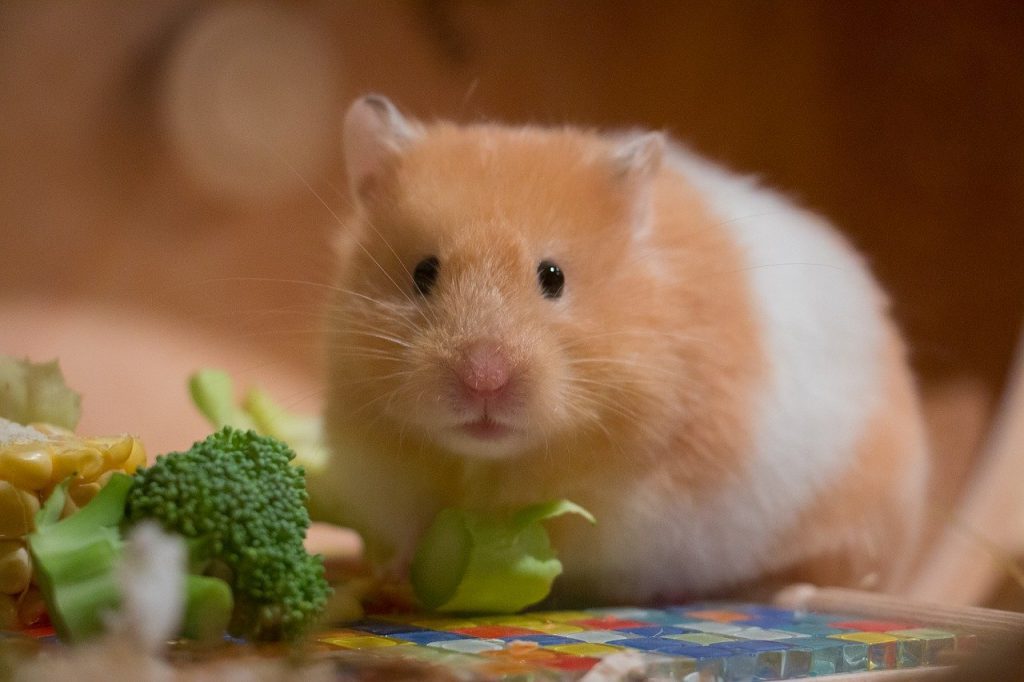If you own a hamster, you’ve likely noticed that your cuddly pet eats like a bird. That is to say, hamster feed contains many ingredients that birds love.
You may be wondering whether birds can eat hamster food and you might have the bright idea to feed both your furry and feathered friends from the same bag?
The answer is yes, birds can eat hamster food but it depends purely on the type of hamster food given.

Like birds, different breeds of hamsters have different dietary needs. Even ignoring that consideration, there are numerous pet food brands that offer different feed blends, with ingredients of varying quality.
Not to mention the fact that not all hamster food comes in the form of unprocessed seeds and nuts. You’ll need to scrutinize the contents of each feed to know if it’s safe for fowl.
If you do find a feed with suitable ingredients, the next step is to determine how to safely prepare and present it.
How Do I Prepare Hamster Food for Birds to Eat?
Hamster food comes in two main forms. There are feed mixes containing whole foods, such as nuts, legumes, seeds, and dried fruit. Alternatively, there are processed pellets, that also contain many of the same ingredients, but not in their original form.
A whole food mixture can be presented much like bird feed. You can pour it onto a tray or bird table, or scatter it onto the ground.
You can load it into feeders, but be aware that because hamsters have no issue breaking hard morsels apart, their feed tends to contain whole, unshelled seeds and kernels. These are only suitable for larger birds. So, if you do use a feeder, make sure it can accommodate them.
Food pellets present a few different concerns. They can be placed on a tray or table in much the same way as the other type. As for their size, it can vary, but they are usually on the larger side and fairly firm. Once again, larger birds are likely to be the benefactors.
Things begin to look different when you toss the pellets on the ground. First, they break down fairly easily in water. If it happens to rain, or they are in the yard when the dew is heavy, pellets will turn into an unappealing mush.
This soggy feed can become home to bacteria, and is attractive to insect pests. Moreover, even if it stays dry it will attract other rodents. Pellets are appealing to the hamster’s cousins: mice and rats. If you offer up this type of feed, place it in raised locations, inconvenient to scavengers.
Is Hamster Food Good for Birds?
This question, just like the main one, depends on the type of hamster food. Whole food blends can be more or less identical to bird blends, and these are at least nutritionally acceptable to birds.
However, the mixture is formulated with hamsters in mind. There will be a greater emphasis on protein, and much less of the fats that birds require.
Dried fruits in hamster feed may contain sulfur dioxide, a toxic chemical detrimental to bird health. Check the ingredients list and steer clear if you see this compound listed.
Hamsters also have a special concern that is reflected in their diet. Their teeth grow continuously throughout their lifespan. To keep them from growing too long and causing injury, hamsters have to wear them down gnawing on hard objects.
Their feed mix helps with this by including tough ingredients like dried corn kernels and unhulled seeds, and the pellets are hard as well. While this wouldn’t pose any trouble for a crow, small birds like robins would be left out.
Speaking of pellets, they are a less desirable option. They are specially formulated to provide optimal health for hamsters. Unlike feed containing whole foods, birds can’t pick and choose what they need when eating pellets.
To the extent that the pellet is a blend of natural ingredients, this is fine. However, pellets can contain special probiotic mixtures formulated to improve digestion and nutrition uptake in rodents. That same mixture in the belly of a bird could completely upset proper digestion.
Still, it’s not all bad. Hamster feed’s high protein and fibre content will be welcomed by birds during mating season. Likewise, they can benefit from the presence of the vitamins and antioxidants with which such feed is fortified.